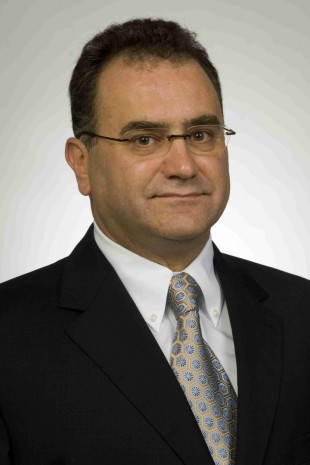Rice bioengineer elected to national academy for his pioneering research in tissue engineering
Rice University bioengineer Antonios Mikos, a pioneer in the field of tissue engineering, has been elected to the National Academy of Engineering (NAE) — one of the highest professional honors accorded an engineer. He becomes Rice’s 14th active NAE member.
Mikos, Rice’s Louis Calder Professor of Bioengineering, professor in chemical and biomolecular engineering and director of Rice’s Center for Excellence in Tissue Engineering, was among 66 new members elected to the academy this week. He was selected “for advances in tissue engineering, regenerative medicine, biomaterials and drug delivery, including development of biodegradable polymers.”
Tissue engineering, also known as regenerative medicine, is a fast-developing field in which researchers aim to amplify the body’s natural healing powers to rapidly grow new tissues. In some cases, materials are implanted at the site of an injury; in others, tissues are grown in a lab and implanted by surgeons.
Mikos, 51, is a pioneer in the field. He co-founded three of the leading tissue engineering journals and is the immediate past president of the North American Tissue Engineering and Regenerative Medicine International Society. In 2008, the Department of Defense selected Mikos and colleagues from the University of Texas Health Science Center at Houston to spearhead a national effort to find new ways to quickly grow large volumes of bone tissue that surgeons need to reconstruct the faces and skulls of wounded soldiers returning from Iraq and Afghanistan.
Mikos said he was surprised and grateful when he learned of his election to the NAE. He said it was a dream come true, but it would not have been possible without the stellar students and exceptional colleagues with whom he has worked throughout his career.
“It is the amazing students and colleagues and Rice’s support that have made all the difference,” Mikos said. “I am truly thankful.”
Mikos, who earned his Ph.D. at Purdue University, joined Rice in 1992 after stints as a postdoctoral researcher at the Massachusetts Institute of Technology and Harvard Medical School. He has authored more than 440 publications, edited 14 books, and his research has been cited more than 28,500 times. He holds 25 patents and he has mentored 50 graduate students and 35 postdoctoral fellows.
“Tony Mikos has made truly seminal contributions to biomaterials for tissue engineering,” said Ned Thomas, Rice’s William and Stephanie Sick Dean of Engineering, who is also an NAE member. “His group is world-class in the molecular design, synthesis, processing and properties of hydrogels for enabling tissue and bone regeneration. Having Tony here at Rice contributes immensely to the strength of our great Bioengineering Department.”
Among his many accomplishments, Mikos and his colleagues have created nontoxic materials that can act as scaffolds, or templates, for new tissue. When used surgically, these materials guide the body’s cells as they replace soft tissue or bone that’s been lost to disease or injury. Some of the scaffolds developed in Mikos’ lab require minimal surgery; they are injected as a liquid that hardens within a few minutes and acts as an immediate aid in the body’s efforts to heal.
Another newly elected NAE member, Rice alumna Barbara Boyan ’70 at the Georgia Institute of Technology, was also selected for her accomplishments in tissue engineering and regenerative medicine. Boyan, who earned bachelor’s, master’s and doctoral degrees at Rice, is the Price Gilbert Jr. Chair in Tissue Engineering; associate dean for research; and the Georgia Research Alliance Eminent Scholar in the Wallace H. Coulter Department of Biomedical Engineering at Georgia Tech. She was elected an NAE member “for engineering implant technologies for bone and cartilage repair.”
Mikos said his and Boyan’s election among others to the academy shows that the field of regenerative medicine is maturing.
Fellow NAE member Nicholas Peppas, the Fletcher S. Pratt Chair in Engineering at the University of Texas at Austin, agreed, and pointed to the impact of Mikos’ own research.
“Tony has pioneered biomaterial-based approaches that have already been translated to the clinic to address aesthetically and functionally devastating large craniofacial bony defects,” Peppas said.
Peppas said Mikos’ “early work established critical relationships between material and scaffold parameters such as porosity and mechanical strength and cellular interactions with these scaffolds. Tony has also made important, highly cited and successfully applied discoveries in the areas of controlled release, and extracellular matrix generation, mimicry and utility for tissue engineering purposes.”
Mikos is a founding editor and editor-in-chief of the journals Tissue Engineering Part A, Tissue Engineering Part B: Reviews and Tissue Engineering Part C: Methods. He is also the organizer of “Advances in Tissue Engineering,” a continuing-education course that has been offered annually at Rice since 1993.
Mikos’ numerous honors include the Founders Award from the Society for Biomaterials; the Meriam/Wiley Distinguished Author Award from the American Society for Engineering Education; the Robert A. Pritzker Distinguished Lecturer Award from the Biomedical Engineering Society; the Edith and Peter O’Donnell Award in Engineering from The Academy of Medicine, Engineering and Science of Texas; and the Marshall R. Urist Award for Excellence in Tissue Regeneration Research of the Orthopaedic Research Society. He is a fellow of the American Institute for Medical and Biological Engineering, the American Association for the Advancement of Science, the International Union of Societies for Biomaterials Science and Engineering, the Controlled Release Society and the Biomedical Engineering Society.
Established in 1964, the NAE advises the federal government on matters related to technology and engineering. NAE membership honors those who have made important contributions to engineering theory and practice, including significant contributions to the literature of engineering theory and practice, and those who have demonstrated unusual accomplishments in the pioneering of new and developing fields of technology. The academy is autonomous in its administration and in the selection of its members. Counting this week’s additions, the NAE has 2,254 members.



Leave a Reply